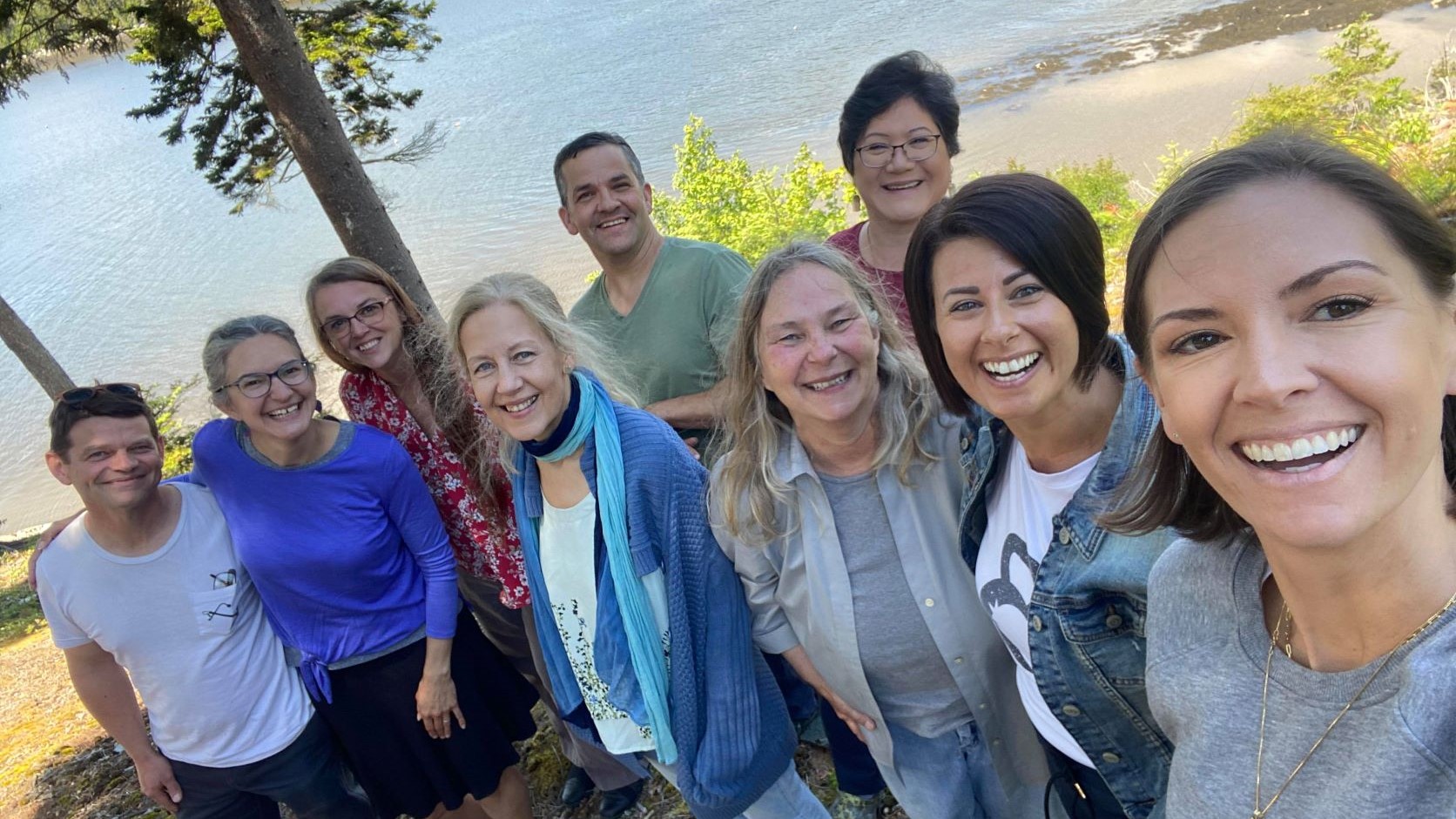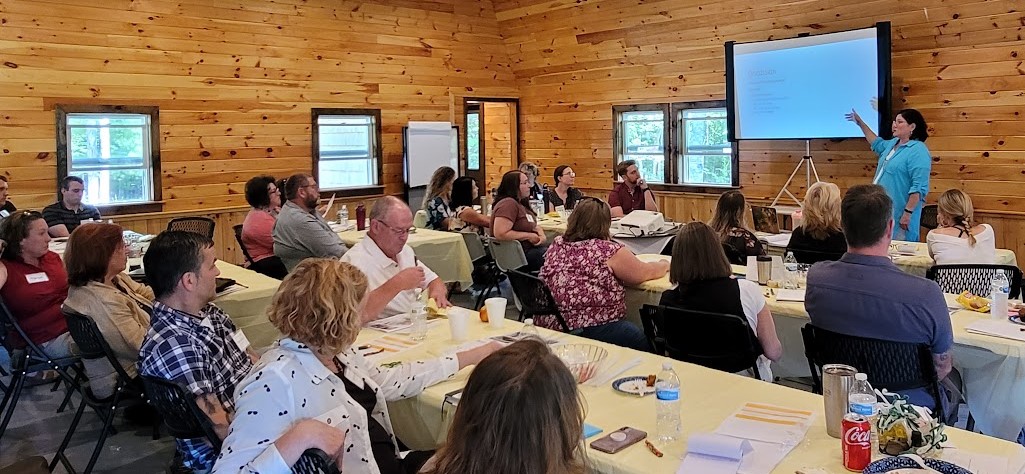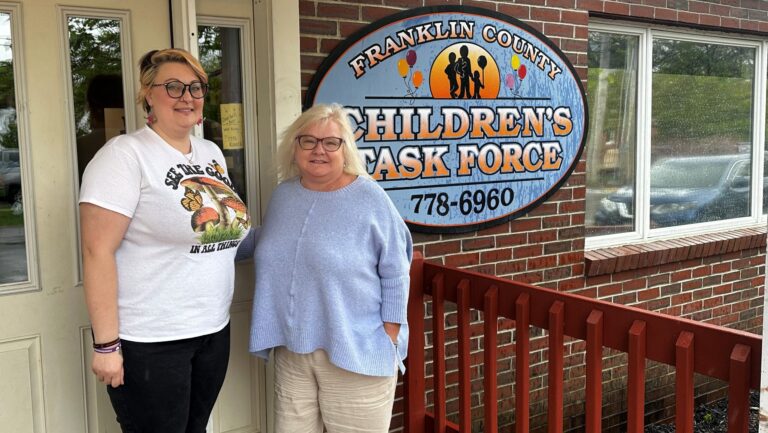The Community Caring Collaborative is working to align partners in improving outcomes for those living in Washington County and Passamaquoddy communities

Two challenging elements set the stage for the creation of the Community Caring Collaborative (CCC), a longtime John T. Gorman Foundation partner, in 2007. One was a set of troubling statistics for young children and their families living in Washington County and Passamaquoddy communities – among them, high rates of children being put into state care, children being suspended from early education because of behavioral issues, and the number of babies born with substance withdrawal.
The second condition was a fractured set of organizations who were working to support families through the incredible difficulties of poverty, substance use, and trauma.

“The landscape was not one of collaboration,” said CCC Director Charley Martin-Berry, a John T. Gorman Fellow. For instance, a mother in recovery whose baby was returning from the NICU in Bangor would be referred to organizations in Washington County that weren’t connecting to each other. These siloes made it much more difficult for already compromised families to navigate and coordinate supports, Martin-Berry said. At the same time, biases about poverty and substance use may have been preventing organizations from building the trust they needed to work successfully with families.
While the organizations were committed to the people of Washington County, CCC founder Marjorie Withers saw that the lack of collaboration and communication was keeping negative outcomes from improving. She saw an opportunity for an organization to align the work of partners, act as the connective tissue between them, and cultivate new initiatives to benefit those in Washington County and Passamaquoddy communities. Thus, CCC was born.
“Our work is really about supporting the connectedness of our partners, to help them achieve their missions and improve outcomes for the individuals and systems they’re involved with,” Martin-Berry said. “We’re always trying to achieve two goals: help the partners and help the people they serve.”
CCC works toward those goals with four interconnected strategies: convening, incubating ideas, removing financial barriers, and training.
One of the first things CCC did to improve collaboration was facilitate convenings at multiple levels. It holds a regular meeting of frontline workers from partner organizations – which now number over 50 – to help participants gain an understanding of each other’s work and share learnings. These conversations continue at a leadership level with the CCC Council, where partner directors hear about what frontline workers have relayed, look for areas of collaboration, and align efforts. On Vision Days, CCC brings in all of its partners, as well as community members, to work together on issues and ideas for a better future for the region.
Many of CCC’s successful initiatives have emerged from what community members have shared at Vision Days, said Martin-Berry. “Every program that we help build is done in response to community members who need a solution to something, because we believe they’re the best architect for that solution.”
Family Futures Downeast is the perfect example. Today, this program to support parents through post-secondary education pathways – combined with early education for their children, wraparound supports, and coaching – is recognized nationally as a two-generation model for the way it benefits parents and children simultaneously. Its beginnings came from a Vision Day where parents expressed a wish to continue their education and begin careers despite numerous challenges in their way. CCC helped mobilize existing partners to form the program, which has been highly successful in helping both parents and children advance in their education, family stability, and success.
Other CCC-incubated initiatives have included the Nurse Bridging Program, which brings CCC-trained Infant and Family Support Specialists into homes impacted by substance use disorder and other health risks for infants and families. The Connection Initiative is a comprehensive online platform designed to help community members access the resources they need. And an emerging program is aimed at helping people in recovery succeed in the workforce.

Other programs at the core of CCC remove barriers to help people through challenging times and make progress toward their aspirations. The Hope Fund is available to partner organizations who have clients with financial emergencies that threaten the progress they’ve made. In one case, a parent couldn’t afford to replace their bald tires. In Washington County, a vehicle is essential to get to work, access services, and safely transport one’s children – but for many living in poverty, the cost of a new set of tires is out of reach. The $400 provided by the Hope Fund may not seem like a lot, Martin-Berry said, but these resources can have a long-term positive impact and, in the process, help partners build stronger relationships with the people they serve.
The trainings CCC offers to hundreds of people a year – on trauma-informed/resiliency-building practices, the impacts of poverty and substance use disorder, and building cultural competencies – also help strengthen these relationships. Representing CCC’s core values, these trainings are designed to address the unintended biases that can come between practitioners and the people they are trying to help. CCC has recently started working with the State to deliver trainings across topics of trauma, poverty, substance use, and cultural competency to practitioners statewide.
“Community Caring Collaborative is an important partner for many reasons, and one the John T. Gorman Foundation is proud to support,” said Jennifer Beck, Foundation Vice President, Programs. “The CCC has given birth to some incredibly successful initiatives, including Family Futures Downeast, and embodies the kind of collaborative thinking and people-centered solutions we think are critical to really improving outcomes for people in Maine who are experiencing poverty. This responsive and innovative collaborative is having a significant impact in Washington County, and has established itself as a recognized leader in the state.”
While Martin-Berry said the people of Washington County continue to deal with incredible challenges, the organizations there are not only committed to working to address those issues, but are now in a much better position to do it – together.
“A while ago, the landscape was not collaboration,” she said. “It is now.”


